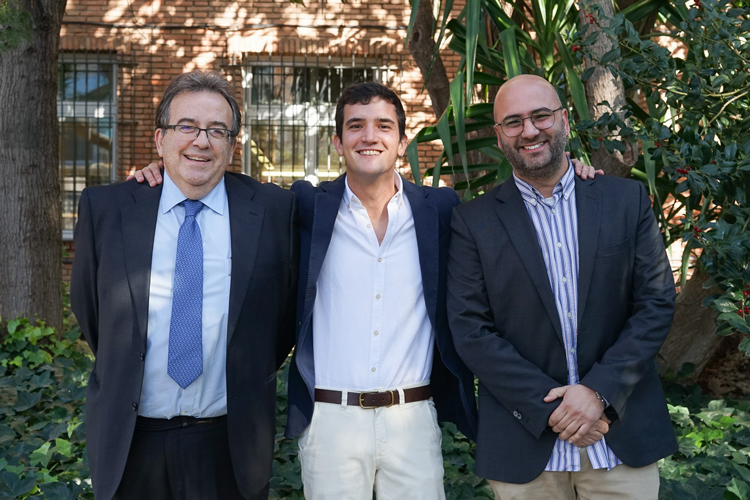Dr Victor Masip recently defended his doctoral thesis at IQS, in which he designed, synthesized, and characterized potential new inhibitors of the ZAP-70 protein for peripheral T lymphoma therapies.

Dr. José I. Borrell, Dr. Víctor Masip, Dr. Albert Gibert
Peripheral T cell lymphomas (PTCL) comprise a diverse group of neoplasms originating from T cells and natural killer (NK) cells. They are characterized by having different morphological patterns, accounting for about 10% of aggressive lymphomas. The survival of patients diagnosed with these diseases is low due in part to the lack of specific treatments presently available.
Protein kinase ZAP-70 has recently been identified as a possible therapeutic target in these types of LCTP lymphomas as it plays a fundamental role in T-cell receptor (TCR) signalling. Therefore, an inhibitor specific to ZAP-70 could block the survival and tumour migration functions associated with TCR stimulation.
The researchers with the Pharmaceutical Chemistry Group (GQF) at the IQS School of Engineering are experts in seeking and developing, both from computational and synthetic pathways, tyrosine kinase inhibitors (TKIs) with applications for different types of cancer. Specifically, the group's extensive experience is based on pyrido [2,3-d]pyrimidin structures, a family of compounds of great interest due to their similarity to the nitrogenous bases found in DNA and RNA.
Within this context, Dr Víctor Masip Bareche conducted his doctoral thesis entitled "Design, synthesis, and characterization of new potential inhibitors of the ZAP-70 protein for the therapy of peripheral T lymphomas." His thesis was carried out in the GQF group under the supervision of Dr José I. Borrell Bilbao and Dr Albert Gibert Bosch. The main objective of his research was the synthesis of new pyrido[2,3-d]pyrimidin-7(8H)-ones with C4 substituents, designed by computational tools, as well as their biological evaluation. The research was done in collaboration with the Vall d'Hebron Institute of Oncology (VHIO).
New ZAP-70 TKIs
The C4 position of the pyrido [2,3-d]pyrimidin-7(8H)-ones has not been greatly explored, and synthetic exploration of this position is therefore of interest to broaden chemical diversity.
In his research, Dr Masip first carried out a study using computational design that enabled him to define the most interesting structures to be synthesized. Second, he established a general synthetic methodology for obtaining 2-(phenylamino)-pyrido[2,3-d]pyrimidin-7(8H)-ones with diverse substituents in the C4 position. The new methodology has made it possible to obtain a total of 59 new compounds in this family, with C4 substituents including N-alkyl, N-aryl, O-aryl, S-aryl, aryl, and aryl ethynyl moieties.
Once the synthetic pathway was developed and the products obtained were characterized, their biological activity against ZAP-70 and other kinases was evaluated by the company Reaction Biology. The assays performed served to make the most suitable structural changes in the molecules to improve their biological activity, on the one hand, and seeking to reduce the toxicity of the compounds, on the other hand.
As a final result of this research, a compound was selected to perform in vivo assays and determine its potential as a drug for the treatment of lymphomas.
Related publication
Victor Masip, Ángel Lirio, Albert Sánchez-López, Ana B. Cuenca, Raimon Puig de la Bellacasa, Pau Abrisqueta, Jordi Teixidó, José I. Borrell, Albert Gibert, Roger Estrada-Tejedor, Expanding the Diversity at the C-4 Position of Pyrido[2,3-d]pyrimidin-7(8H)-ones to Achieve Biological Activity against ZAP-70, Pharmaceuticals 2021, 14(12), 1311
This research has received funding from the Carlos III Health Institute – Ministry of Science and Innovation, through the project “Inhibition of ZAP-70 kinase as a targeted therapy in peripheral T lymphomas” (PI18/01392).










